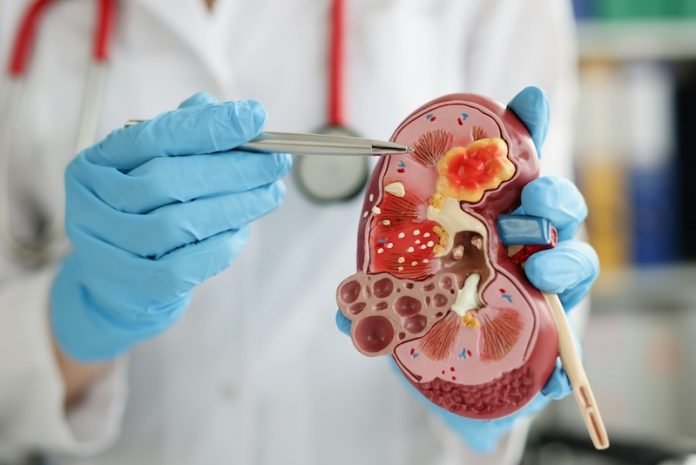
Diabetes is a condition that doesn’t just affect blood sugar levels but also brings with it a host of complications, including problems with the kidneys.
In the UK, diabetic kidney disease is a significant issue, impacting around 40% of those with diabetes. This translates to nearly 5 million people who may face serious treatments like dialysis or kidney transplants.
Among the medicines explored for managing this condition is spironolactone, known primarily for treating high blood pressure. It has a unique function in combating diabetic kidney disease by preventing the loss of proteins through urine.
Yet, its use is limited by a major side effect: the risk of high potassium levels in the blood, which can be dangerous.
Researchers at the University of Bristol have delved deeper into how spironolactone might offer protection to the kidneys, particularly focusing on a protective layer found on kidney blood vessels known as the glycocalyx.
Through sophisticated techniques examining kidney samples, they’ve unveiled two key findings. They observed that diabetes inflicts damage on the glycocalyx, and crucially, that spironolactone has the ability to protect this layer from such harm.
A surprising development in their research was the role of enzymes called matrix metalloproteases, which can damage the glycocalyx layer.
Spironolactone helps by slowing down these enzymes, thus preserving the glycocalyx’s integrity and potentially slowing the progression of kidney disease.
This insight suggests that treatments aiming to inhibit these enzymes could offer new ways to manage diabetic kidney disease without the side effects seen with spironolactone.
For those navigating life with diabetes, there are actionable steps to protect kidney health:
- Control Blood Sugar: Keeping blood sugar within target ranges can reduce the risk of kidney damage.
- Manage Blood Pressure: Aiming for a blood pressure below 130/80 mm Hg helps protect the kidneys.
- Eat Well: A balanced diet rich in fruits, vegetables, whole grains, and lean proteins, while low in salt and unhealthy fats, supports kidney health.
- Stay Active: Regular physical activity can aid in maintaining overall health, including kidney function.
- Avoid Smoking: Smoking can harm blood vessels and increase the risk of kidney problems.
- Follow Medication Plans: Adhering to prescribed medications as directed by healthcare providers is key.
- Regular Check-Ups: Keeping up with appointments allows for ongoing monitoring of kidney function.
The research led by Dr. Matthew Butler, published in JCI Insight, shines a light on potentially more effective treatments for diabetic kidney disease.
It’s a beacon of hope, suggesting that with continued exploration and understanding, we can improve the lives of those dealing with this condition.
As we progress, the goal is not just to manage diabetic kidney disease but to enhance the quality of life for those affected, marking a step towards a future where the disease’s impact is significantly lessened.
If you care about kidney health, please read studies about how to protect your kidneys from diabetes, and drinking coffee could help reduce risk of kidney injury.
For more information about kidney health, please see recent studies about foods that may prevent recurrence of kidney stones, and eating nuts linked to lower risk of chronic kidney disease and death.
Copyright © 2024 Knowridge Science Report. All rights reserved.



